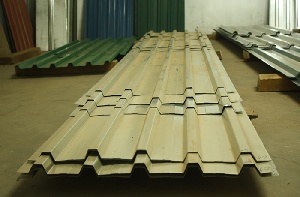They may be disappointed to go another year without dividends, but shareholders of Aluworks left their Annual General Meeting full of hopes, as the company is close to sealing a US$25million strategic investment deal with Vendata Resources, one of the world’s largest natural resources companies with an interest in aluminium and other resources.
“We are talking in a matter of weeks,” Ralph Rossouw, a Director of Vendata Resources told the B&FT on the sidelines of Aluworks’ AGM in Accra, in respect of how close they are to the deal.
“We will resolve the debt issue with SSNIT and VALCO, and then more importantly do value added products. So we are looking at a foil line which is considered a higher value added product…we will then compete far more than the Chinese. We will replace the Chinese market in Ghana as well as in Nigeria. But that can only be done if we do bauxite mining and alumina refining,” Ralph Rossouw said.
“By investing in Aluworks we intend to go into bauxite mining, which we currently do globally. We would then develop alumina refineries in Ghana…we have done that also globally. We would then assist VALCO to get their five pot lines back up and running; they are currently running at 20% capacity. So we would provide them with feedstock to run at 100% capacity. If VALCO does a 100% Aluworks will be able to run at 100% capacity,” he added.
Chairman of the Aluworks Board of Directors, Serth Adjei, told shareholders that the share price for the new investor’s stake in the company is being negotiated, assuring them that it would be one to give them value for money.
To turn around its negative books, Aluworks, which is bogged down by the three-pronged difficulty of capital, market and raw materials, would have to retire a debt of about US$15million dollars, a chunk of which it owes its largest shareholder SSNIT.
In 2012, Aluworks took a US$10million (GH?18.2million) from SSNIT, which has 62.62% stake in the company, to finance a new cold mill which it commissioned at the beginning of 2015.
But the combination of exchange rate depreciation and increase in interest rates over the years has ballooned the loan figure to GH?43million.
The aluminium products manufacturer also owes VALCO, its raw materials provider, close to US$3million, while the energy crisis led to a cutback on electricity supply to VALCO, thereby severely affecting raw materials supply to the former.
Losses
Aluworks thus ended the year 2015 with a loss before tax of GH?14.231million compared to a 2014 loss of GH?4.982million. The company has since 2007 been running at a loss due mainly to low volumes as well as forex exchange losses.
Turnover for 2015 came to GH?78.665million as against GH?76.845million in 2014, whilst operating profit dipped from GH?4.666million in 2014 to 2.524million in 2015.
In 2015, the company sold a volume of 6,171 tonnes of products, which is 20% down on the 7,947 tonnes sold in 2014.
“Cheap imported material in Nigeria from China and the effects of the reforms by the new President led to a continued reduction in exports orders from that country, much to our detriment,” the board chairman stated.
“The new cold mill was commissioned at the beginning of the year, but was inactive for about four months due to a series of fires that had to be thoroughly investigated and curtailed.”
The chairman added that: “Under the circumstances above, your Board, once more time, does not recommend the payment of dividends to shareholders.”
New trade commission law expected to curtail cheap imports
Aluworks has hinged its hopes of overcoming the challenge posed by cheap Chinese imports on the Ghana International Trade Commission Bill, currently before parliament.
The company has complained severally that its dwindling fortunes are also as a result of cheap Chinese aluminium imports, buoyed by a kind export rebate by the Chinese government, taking over the Ghanaian market.
The government of Ghana applied to the World Trade Organisation and has been given the go ahead to put in place countervailing measures Aluworks has been calling for.
The Ghana International Trade Commission will replace the Tariff Advisory Board, and will have the legal powers to impose the countervailing measures.
“It [the countervailing measures] is not novel to Ghana; other countries have done it – India, Canada, Australia, USA have all done it. A small country like us who are actually suffering were doing nothing. So we got government to go to WTO, which has given us its blessing to do it,” Ernest Kwasi Okoh, MD of Aluworks told the B&FT.
Checks by the B&FT reveal that the US has imposed additional tariffs of +59.31%; whilst Canada has additional tariffs of +179% of shipment value. India and Australia have imposed +12-14% and +16% tariffs on Chinese imports respectively.
“What the countervailing measures says is this: in China they are giving export rebates. So let’s say they produce at 100, then they give a rebate of 40. So their traders take it at 60 and bring it here. We are selling at 100, they come and sell it at 60. So a countervailing measure would be they have reduced it by 40, when it gets here we add 40,” Mr Okoh explained.
Aluworks is confident that once a level playing field is created it can outcompete the Chinese with what it considers to be its superior quality products.
Aluworks was incorporated as a private company limited by shares on the 24th day of February 1978, but was converted to a public limited liability company in May 1996. Aluworks is the only company that processes or casts aluminium ingots in Ghana and provides one of the vital links in the chain in aluminium processing in the country.
Vedanta Resources, on its part, is a London Stock Exchange listed, globally diversified natural resources company with interests in Zinc, Lead, Silver, Copper, Iron Ore, Aluminium, Power and Oil & Gas.
Business News of Monday, 4 July 2016
Source: B&FT













